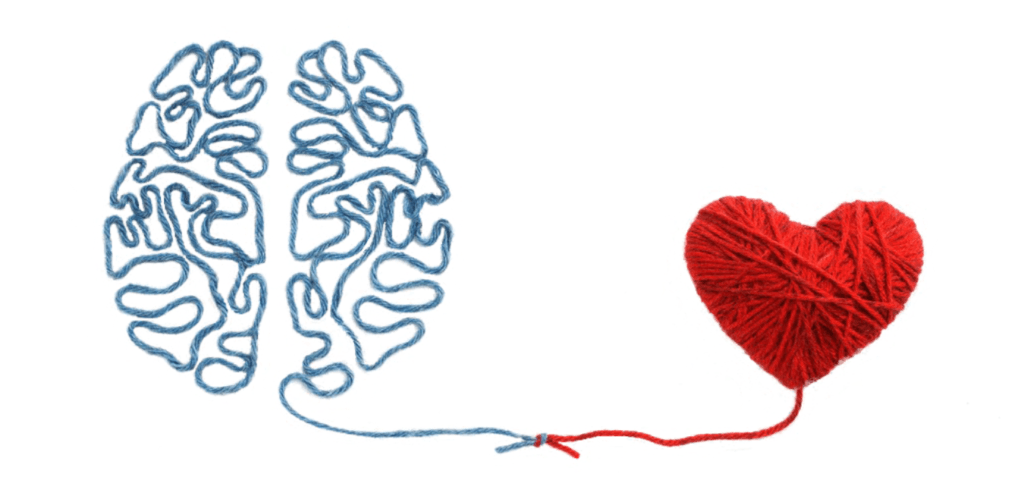Par Amélie Bédard, professionnelle à l’inclusion scolaire au CSSDPS
Équilibre. Indulgence. Bienveillance. Besoins. Apprentissage. Bien-être.
Ces mots se tricoteront tout au long de ce texte, comme le font quotidiennement les petites laines entrelacées de notre cœur et de notre cerveau. Lorsque notre cœur – notre centre de contrôle émotionnel – est envahi par nos émotions, il entre en déséquilibre et s’emballe, tirant ainsi la laine vers lui, détricotant au passage notre cerveau et ses compétences cognitives.
Bien sûr, dans les faits, tout se joue dans le cerveau. Il reste que cette métaphore chargée de sens démontre bien l’interdépendance entre ce que nous appellerons le cœur (l’affect) et le cerveau (l’intellect). Une interdépendance qu’on ne peut plus ignorer, pour le bien-être de nos enfants, mais aussi le nôtre.
Comme enseignants, nous prenons de plus en plus conscience que le cœur de nos élèves est un précieux trésor dont il faut prendre soin, pour cultiver toutes les petites merveilles qu’il recèle et qui activent leur cerveau d’apprenant.
Mais comment en prendre soin? Et pourquoi le bien-être est-il si important à l’école?
Je crois profondément que tout être humain qui se sent accepté, compris, aimé, écouté, accueilli, guidé et accompagné ne peut devenir qu’engagé, bienveillant, accueillant et aimant. À tout le moins, ces facteurs de protection lui donneront les fondations nécessaires pour s’ouvrir aux autres, développer le goût d’apprendre et oser prendre des risques.
En prenant soin du cœur de nos élèves, en nourrissant leur sécurité affective, nous les rendons disponibles à l’apprentissage, et leur donnons la chance d’exploiter leur cerveau à sa pleine capacité. Ils deviendront ainsi des « apprenants-actifs-citoyens-de-demain-en-sécurité-affective » prêts à affronter le monde qui les entoure. L’environnement scolaire dans lequel ils évoluent doit être empreint de chaleur humaine et réunir les conditions gagnantes permettant de diminuer les stresseurs. Bienveillance, accueil et sécurité affective : c’est ainsi que nous leur offrons un équilibre émotionnel, essentiel à leur bien-être pour les aider à devenir la meilleure version d’eux-mêmes.
Et le cerveau dans tout ça?
Notre cerveau est une véritable mine d’or qui nous permet de nous développer, de comprendre et d’apprendre. Si complet et si fragile à la fois, il a besoin de l’équilibre du cœur pour poursuivre son chemin. Moteur incroyable de créativité et d’apprentissage chez nos élèves, il ne peut fonctionner rondement sans sécurité affective. C’est pourquoi on ne peut faire fi du cœur ni le traiter distinctement quand il est question d’apprentissage et de développement de compétences. C’est le cœur et sa sécurité affective tricotée bien serrée qui laissent au cerveau le fil, la latitude nécessaire pour se déployer efficacement. Quelle occasion ratée ce serait, pour nous, enseignants, mais aussi pour les élèves, si nous n’avions pas accès à tout le potentiel contenu dans ce moteur.
Qu’on soit adulte ou enfant, notre fonctionnement n’est pas différent, nous sommes tous des apprenants. Face à de nouveaux apprentissages, à des changements et du stress, nous ne pouvons nous réguler que si le cœur et le cerveau gardent l’équilibre.
Face à de nouveaux apprentissages, à des changements et du stress, nous ne pouvons nous réguler que si le cœur et le cerveau gardent l’équilibre.
L’équilibre commence par le cœur
La meilleure façon de voir fleurir la créativité et le désir d’apprendre des élèves est de s’occuper de leur cœur, de nourrir leur sécurité affective et de les accueillir comme ils sont. Dans cette grande aventure qu’est l’enseignement, soyez indulgents avec eux, mais également avec vous. Votre cœur – et votre cerveau! – vous remercieront.
Nous savons que l’éducation est une science en mouvement, en évolution, qui vient avec tout un lot de questionnements. Dans cette recherche d’équilibre entre le cœur et le cerveau, une grande question demeure… Comment pouvons-nous faire autrement?
La réponse se trouve sans doute à l’intersection de deux petites laines solidaires. Je propose quelques pistes de solution dans cette conférence donnée au Congrès d’été de l’Institut sur les troubles d’apprentissage intitulée Et si une approche inclusive et universelle était la solution pour s’adapter à la situation actuelle?






